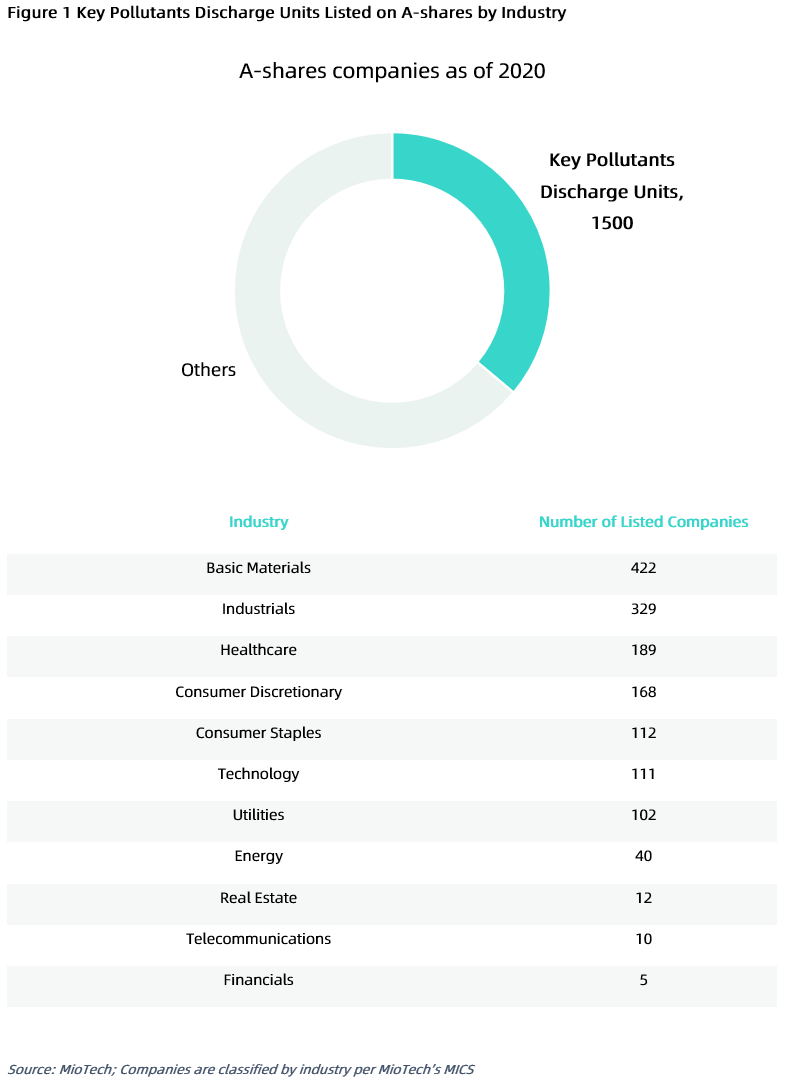Policies Covered in This Note:
-
Standards for the Contents and Formats of Information Disclosure by Companies Offering Securities to the Public No. 2—— Annual Report (in Chinese only)
Key Findings:
- Mainland China is catching up to global standards on corporate sustainability reporting, releasing stricter guidelines on May 7 that will mandate at least one-third of A-share companies to make environmental disclosures.
- Hong Kong has the longest history in imposing disclosure requirements in the Greater China region; the S.A.R. has recently tightened it so that companies that do not disclose ESG reports are required to explain why. In 2020, over 95% of HKEX-listed companies issued ESG disclosures.
- Taiwan-listed companies overall can be praised for the high quality of their ESG disclosures which are voluntarily pegged to global sustainability standards, though most of their ESG out-performers are concentrated in the food, chemical, and finance industries.
Mainland China: CSRC issues draft standards
On 7 May 2021, the China Securities Regulatory Commission (CSRC) hosted discussions on the need for listed companies to release more comprehensive environmental disclosures. The resulting draft policy was subsequently referred to as “Standards for the Contents and Formats of Information Disclosure by Companies Offering Securities to the Public No. 2 and No. 3".
The Standards will tighten the reporting of environmental disclosures by companies that are labelled as “Key Pollutant Discharge Units” – these companies make up a watch list of entities which are deemed to have caused considerable negative impacts on water, air, soil and sound environment. This list is evaluated annually by municipal environment regulatory bodies; most of the key pollutant discharge units are in sectors like coal-fired power generation, fossil fuels, and nonferrous metals, but any company can be labelled as such when they have a record of discharging a considerable amount of certain pollutants. According to data from MioTech, 1,500 listed companies in total were labeled as key pollutant discharge units; this is more than one-third of all the 4,154 companies listed on A-shares as of 2020.
The CSRC plans to make it mandatory to disclose the volumes of different types of pollutants emitted by the listed companies labelled as key pollutant discharge units. It also wants firms to release other information regarding the impacts of their established projects and the initiatives taken to tackle them. In addition, the CSRC aims to introduce a new cluster of indicators in the environmental and social pillar, in particular initiatives taken to reduce a company’s carbon emissions.
Hong Kong: Aiming for higher reporting rates
As one of the largest stock exchanges, Hong Kong Exchanges and Clearing (HKEX) started paying attention to sustainability disclosures in 2015. In July 2020, the exchange introduced three mandatory ESG categories while replacing the remaining “recommended” disclosures with “comply or explain” obligations. However, neither environmental nor social indicators were positioned as mandatory disclosures.
The HKEX has set four main areas of concern: emissions, energy, waste, and water. Under disclosure rules, companies are required to reveal numbers related to these key areas, their reduction targets, and the actions they intend to take to make these reductions happen. According to standards set by the HKEX, listed companies can either disclose this ESG data, or they will need to convince the exchange that the disclosure is not necessary (referred to as “Comply or Explain” provisions).
Taiwan: TWSE rules on Corporate Social Responsibility Reports
Because it is the smallest bourse of three within the Greater China region, Taiwan opted out of setting its own standards and instead in January 2020 adopted GRI Standards -- a major set of reporting standards developed by the Global Reporting Initiatives (GRI).
The rules published by Taiwan Stock Exchange (TWSE) make corporate social responsibility reports mandatory for companies that:
-
Are in the food, chemical, or financial and insurance industries;
-
Have no less than 50% of the company’s revenues from food or beverage for the most recent fiscal year;
-
Have no less than NTD 5 billion recorded in capital stock for the most recent fiscal year;
Following the criteria above, more than 270 TWSE-listed companies are meant to release corporate social responsibility reports for 2021. According to the exchange, 247 companies released the reports for 2020 out of 942 companies listed before 2021.
Generally, the GRI Standard requires more topics to be disclosed and applies a broader scope of indicators for each topic than HKEX and CSRC standards.
Effluent and biodiversity issues are mentioned in GRI Standards and it is worth noting that GRI standards require companies to disclose how they achieved their numbers, while HKEX does not. The GRI’s numeric disclosures quantify energy production and effluent, compare marked reduction in emissions and energy use, report volumes of recycled waste and water, as well as the number of endangered species found in areas where companies operate.
Other things to mention...
The combination of mandatory and “comply and explain” requirements leave HKEX-listed companies with few choices. In 2019, the regulations spurred 2,418 out of 2,525 companies listed on HKEX into making sustainability disclosures, while 1,030 out of 3,950 A-shares companies listed by 2019 did so without mandatory requirements imposed. In Taiwan, whilst mandatory regulation for specific groups of companies and the adoption of GRI Standards saw over 200 companies outperform in sustainability disclosures, TWSE-listed companies that don't fall under any of the three categories have thus far chosen not to disclose their data. This lead to an overall reporting rate of 26% and a performance gap between companies.
The future of ESG reporting looks bright; notably, listed companies now tend to voluntarily improve their reporting and refer to either widely-recognized standards of GRI and HKEX in their annual reports or other types of sustainability guidelines.






